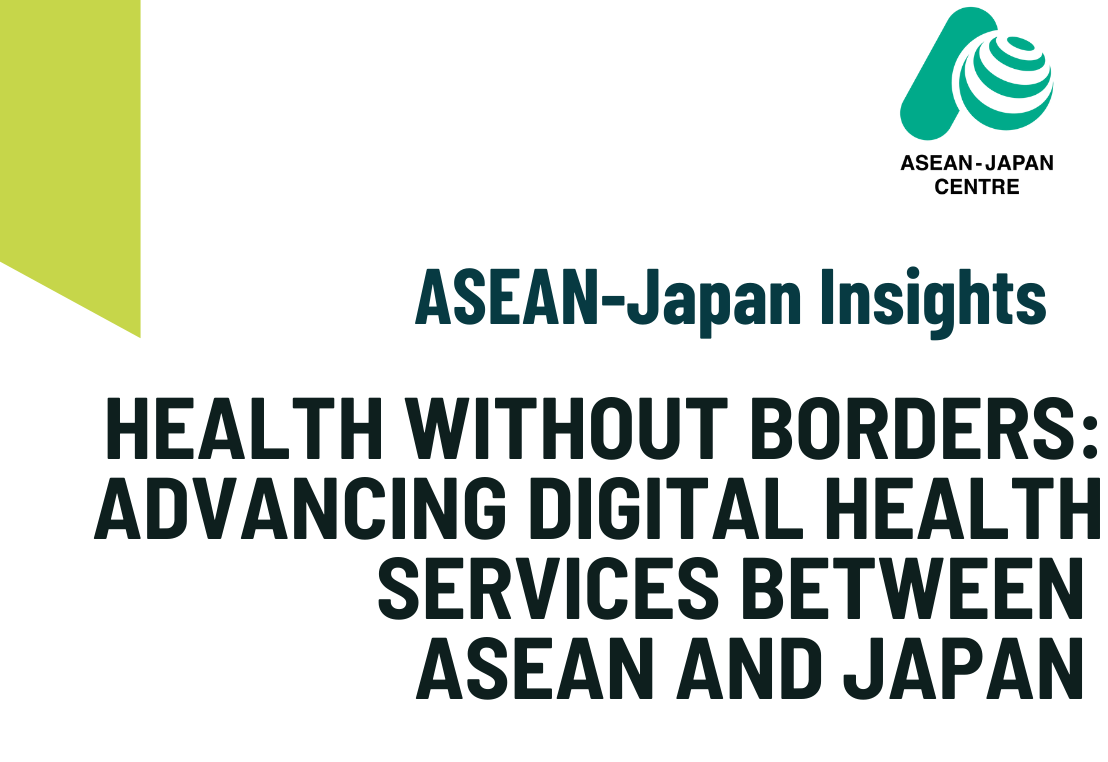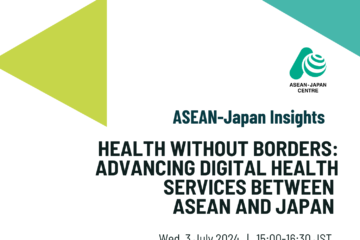The Asia-Pacific is set to become the fastest-growing region in healthcare spending, and by 2030 will account for more than 20% of global spending (Bain & Company, 2024). Driven by necessity, the COVID-19 pandemic significantly and unprecedentedly accelerated the adoption of digital health technologies, particularly telehealth across Southeast Asia. Faced with disrupted access to medical care, ASEAN member states rapidly embraced telehealth, adapting regulations to facilitate teleconsultations and remote healthcare services. Despite this progress, several fundamental challenges remain for establishing a robust digital health ecosystem in the region. Key issues include the development of digital transformation guidelines tailored to healthcare and data protection, interoperability of health data systems, and addressing patient trust in digital services.
The ASEAN-Japan Insights’ webinar 3, “Health Without Borders: Advancing Digital Health Services between ASEAN and Japan” unraveled the current status and challenges in the governments’ initiatives to scale the digitization of national medical records, establish robust cybersecurity systems in the face of rapidly advancing technologies, and promote innovation through private sector companies.
The webinar included speakers from the government, ecosystem builder, business, and accelerator perspectives in understanding the potentials, challenges, and opportunities of advancing digital health services in Japan and ASEAN member states (AMS). The following speakers presented on the following topics:
- Mohamad Hazwan Daut, PhD (Head of HealthTech Hub, Malaysian Research Accelerator for Technology & Innovation/MRANTI)
– “MRANTI’s role in revolutionizing healthcare” - Takanori Fujita, MD, JD (Senior Fellow, The Tokyo Foundation for Policy Research)
– “Digital health in Japan” - Ho Yuan Lu (Vice President, Outreach & Talent Development, Diagnostics Development Hub, at Singapore Agency for Science, Technology and Research A*STAR/Chief at Singapore Public Sector Science & Technology Policy and Plans Office)
– “An introduction to Diagnostics Development Hub” - Kazuma Abe (President and CEO, MEDRiNG)
– “Strategy of MEDRiNG”
The Centre’s Research and Policy Advocacy Programme Manager Katrina Navallo, PhD, presented the findings of the recently published report, “Assessing Digital Health Adoption in ASEAN” and moderated the panel discussion. The report found that the lack of trust in data protection and cybersecurity and the fragmentation of digital health systems are among the current challenges for the full adoption of digital health in the ASEAN region and Japan. It offers the following recommendations in the areas of governance, workforce, and innovation for governments in ASEAN and Japan:
- Build trust through data protection and governance:
- Develop standards for data interoperability;
- Enable digital startups to drive innovation; and
- Promote healthcare professionals’ digital health training support.
The panel discussion covered three rounds of questions that teased out the digital health challenges and opportunities done in Japan, Singapore and Viet Nam.
1. Medical data protection and cybersecurity issues
Based on the published report by the ASEAN-Japan Centre, cybersecurity threats and lack of trust in data protection hinder the adoption of digital health in the ASEAN region. Taking from the experience of a Japanese electronic medical record provider company in Viet Nam, MEDRiNG has ensured the security of patient data in their platform by employing a cloud-based software from a trusted vendor. Abe explains that cloud-based EMR often employs a multi-layered security approach to safeguard the patients’ data. The first layer of security anonymizes the data by removing clinical details from audit logs and shields the identity of the patients. The second layer of defence is the encryption using Advanced Encryption Standard (AES) which renders the data unreadable without a decryption key. This makes the data inaccessible even if it has been intercepted by external threats.
2. Regulatory and policy frameworks
From a national perspective, Singapore addresses the challenges of data protection in general from three standpoints: regulatory, digital health tools, and human and culture. Ho highlights that Singapore has implemented a number of regulatory guidelines for medical data protection, including the Health Information Bill (Ministry of Health), Cyber & Data Security Guidelines developed in consultation with regulatory bodies, Cybersecurity Agency of Singapore (CSA), Infocomm Media Development Authority, and Personal Data Protection Commission (PDPC). To promote public cybersecurity education, the Ministry of Health released the Artificial Intelligence in Healthcare guidelines. Ho noted that alongside regulatory policies, cultivating a culture of trust is an essential component in strengthening national cybersecurity capabilities.
Viet Nam has announced the forthcoming Law on Personal Data Protection (PDP Law), and coupled with the implementation of the Viet Nam Personal Data Protection Decree in July 2023, signal a significant step to bolstering data privacy measures in the country. The PDP Law aims to establish frameworks and regulations to guarantee the secure management, processing, and utilization of personal data in the country.
3. Technology and innovation in digital health
The emerging technologies that holds the most promise for advancing digital health in Singapore include AI, telemedicine, cloud-based technology, digital health records and patient flow automation, and blockchain. AI is being used to improve diagnostics, treatment plans and healthcare delivery. While still emerging, blockchain technology has the potential to enhance data security and integrity in healthcare, ensuring that patient records are tamper-proof and easily accessible by authorized personnel.
In Japan, Fujita shared that the Digital Agency promotes the use of the Trusted Web in creating a new trust framework to enable users to manage and control their data, and verify the exchanged data, as well as the entities with whom the data is shared. This framework is currently exploring use cases for integrating new technologies into the existing healthcare system, for example sharing data with stakeholders during clinical trials.
4. Workforce development
With the speed of technological advancement, building a skilled workforce with the knowhow of the latest digital solutions in their areas of specialization will be necessary. Not only that, but being able to use the technology effectively, responsibly and ethically will be of utmost importance to ensure the safety of the patients and users.
In Singapore, the government has launched the Healthcare Cybersecurity Essentials which provides guidelines on basic cybersecurity measures to ensure the security and integrity of IT assets, systems and patient data. The SkillsFuture Singapore also provides training for local professionals to stay ahead of the latest developments through skills building in their areas of expertise.
5. Towards closer cooperation in digital health between ASEAN and Japan
Japan has been actively promoting international business collaborations and exporting its technological products and services overseas including in ASEAN countries, such as through government-supported organizations like Medical Excellence Japan (MEJ) and JETRO’s J-Bridge program. In the context of digital health, Fujita noted two significant challenges may arise: language barrier and differences in the health care systems. He emphasized that for successful cross-border initiatives, Japan may also learn from other countries in addressing these barriers and finding common solutions. Also, he offers the benefits of co-developing new products with ASEAN countries who may offer new solutions, and expanding the market to North America and Europe, where the digital health market is bigger.
Such a collaboration is welcomed by Ho, emphasizing that since Singapore is a relatively small country, there is much reliance on partnerships to advance the supply and demand of digital health resources to enable sustainable solutions. This includes sharing of resources for innovation, manpower training, tech transfer, and market access among others.
Recording of the Webinar
You can access the full recording of the webinar on YouTube.
The ASEAN-Japan Insights Series
The Series aims to be a relevant and leading information sharing platform in the region on ASEAN-Japan matters. It is a hybrid, bilingual (English and Japanese) webinar series that features hot topics in ASEAN and Japan and facilitate information sharing and knowledge sharing among industry, academia, governments, and enterprises within the region. Each webinar will be co-organized with a partner institution in ASEAN to foster cross-collaboration and co-creation between ASEAN and Japan stakeholders. For more information, please email the Research and Policy Advocacy Cluster at info_rpa@asean.or.jp.



